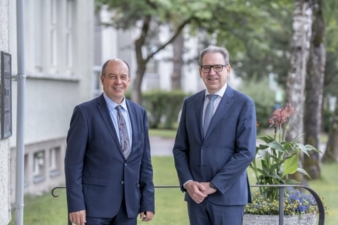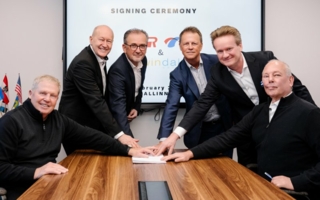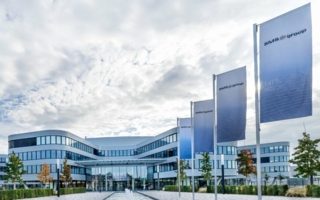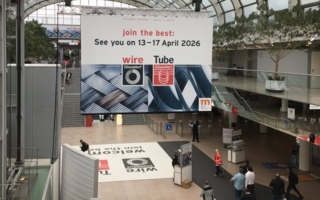29/07/2022 – After the acquisition of Ceratizit
Sales record thanks to major effort
In total, the Plansee Group achieved sales of 2.02 billion euros in the fiscal year 2021/22 – 56 percent more than in the previous year.
The general conditions were anything but favourable: Disrupted supply chains, significant increases in raw material costs and long delivery times presented the Plansee Group with major challenges in the past fiscal year. However, the strong economy, internal improvement measures and the full consolidation of the hard metal subsidiary Ceratizit led the Tyrolean Group to a new sales record.
Excluding the effect of fully consolidating the Ceratizit subsidiary for the first time, the increase in sales would have been 15 percent. In the past, the Plansee Group held a 50 percent stake in Ceratizit and had acquired a majority stake in the Luxembourg-based company on March 1, 2021. Organic growth is based on the rapid recovery of many sectors following the pandemic and strong demand from the semiconductor, medical technology and construction industries.
“First the pandemic, then supply chain problems, now the Ukraine war. These challenges were and are a major effort for our employees and managers. A major effort that we are successfully mastering,” said Karlheinz Wex, spokesman of the Plansee Group Executive Board, at a press event in Reutte. In the 101st year of its existence, the Group has reacted quickly to the economic upturn, expanded its market position and invested a lot of energy in the further development of the organization. Looking ahead to the current fiscal year, Wex was optimistic about the first half of the year. The Plansee Group is on solid economic footing and the order books are well filled. At the same time, however, Wex also pointed to the risks: the unpredictable consequences of the Ukraine war, uncertain gas supplies, rising inflation, increasing trade barriers between countries and regions, and excessive stockpiling in some supply chains. “This is causing us problems and will have an impact on our economic development in the second half of the year,” said the CEO.
Sustainably positioned for the future
With the implementation of a sustainability strategy, the Plansee Group has initiated a change in technology. “For the past 20 years, we have been producing hydrogen primarily from natural gas. Hydrogen is required as a process gas in several key production steps. In the future, hydrogen will be produced primarily via electrolysis using green electricity. This will enable us to reduce the Group's own carbon footprint by up to 60 percent over the next three to five years,” says board member Wolfgang Köck. According to Köck, increasing the proportion of recycled tungsten products and improving material and energy efficiency will also contribute to this goal.
Karlheinz Wex also calls on politics to ensure a successful energy turnaround: “In view of the quantities of energy that will continue to be required in industrial production in the future, we call on politics to create the necessary framework conditions for a secure, competitive and sustainable energy supply”.
At the “Plansee Seminar” scientific congress in Reutte at the beginning of June, the materials molybdenum and tungsten processed by the Plansee Group were compared with other materials for the first time in a sustainability ranking. Wolfgang Köck: “The results presented here offer interesting starting points with which we can differentiate ourselves from the competition even more clearly than before”. Details are to be published in fall.
Stable tungsten supply
With the acquisition of Ceratizit, the Plansee Group has reorganized its tungsten powder production and made it more competitive. It is increasingly based on recycling. To meet its ambitious recycling targets, Ceratizit has launched an initiative to recover and recycle as much tungsten scrap as possible. The recycled tungsten is used in the Plansee Group to manufacture new products. Modern recycling technologies ensure that products made from recycled tungsten have identical properties to products made from "fresh" tungsten.
Manufacturing sites
At the Group’s largest production site, in Breitenwang/Reutte (Austria), a new production hall for Ceratizit is close to completion. The photovoltaic system installed on the roof with a maximum output of 385 kilowatts in the first expansion stage will soon be put into operation. Plansee has also built a new sintering plant and expanded production capacity for components for medical technology and the semiconductor industry. The site increased its production output by 23 percent to 747 million euros in the past fiscal year. A total of 62 million euros was invested in tangible assets in Breitenwang/Reutte in fiscal 2021/22. In the Group as a whole, the figure was 154 million euros. The Group spent 86 million euros on innovation.
The repositioning of the Mamer (Luxembourg) site has been completed. Here, the foundations were laid for the plant to focus even more strongly in the future on the production of wear-resistant components made of carbide for the manufacturing industry and cutting inserts for the tool industry.
All activities relating to the production of tungsten powder from ore or scrap at the Towanda site (USA) have been integrated into the Ceratizit business area. The site's energy and environmental performance is particularly good due to the high proportion of recycled tungsten scrap used in production. Compared to production from tungsten ore, energy consumption and CO2 emissions are significantly lower in the recycling process.
Key Group service functions such as IT, HR, controlling and finance and accounting have been bundled in Plansee Group Functions. The service company is active at the Reutte, Kempten, Mamer and Towanda sites. With a job campaign, Plansee Group Functions is recruiting IT specialists in particular. These specialists are urgently needed to support the further digitization of the company's activities.
Outlook
The Plansee Group expects difficult external conditions to continue in the current fiscal year. Rising electricity and gas prices, rising inflation, logistics and supply problems in the procurement markets and a lack of skilled workers in several professions are among the challenges. Markets in mechanical engineering, the semiconductor industry and medical technology continue to develop positively. “The good demand in these industries shows that our products and tools made from the materials molybdenum and tungsten will continue to be in demand in many high-tech applications in the future,” says Karlheinz Wex. With the further powerful implementation of the internal optimization project “better together” in the next two years, strategic company acquisitions and process improvements, the Plansee Group continues to work on positioning itself even more efficiently and competitively.
About the Plansee Group
With the Plansee High Performance Materials and Ceratizit business areas and the investment in Molymet, the Plansee Group is one of the world's leading powder metallurgy industrial companies. The Plansee Group specializes in products made from the materials molybdenum and tungsten, covering the entire value chain – from ore concentrate to customized tools and components. The product portfolio includes more than 100,000 different products and tools. The Plansee Group thus enables high-tech devices for everyday use such as smartphones as well as sustainable and efficient solutions for mobility, energy supply and industrial manufacturing. In the fiscal year 2021/22, the Plansee Group achieved consolidated sales of 2.02 billion euros with 11,174 employees. The Plansee Group portfolio (including the 21 percent stake in Molymet) generated sales of 3.16 billion euros with 13,541 employees.




